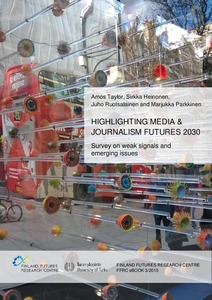Highlighting Media & Journalism Futures 2030 - Survey on Weak Signals and Emerging Issues
Amos Taylor; Sirkka Heinonen; Juho Ruotsalainen; Marjukka Parkkinen
https://urn.fi/URN:NBN:fi-fe2021042715397
Tiivistelmä
The MEDEIA project was carried out at Finland Futures Research Centre (FFRC), University of Turku in 2013–2015, and funded by the Media Industry Research Foundation of Finland, the Building Information Foundation, e21 Solutions, Teknologiainfo Teknova, Ministry of Transport and Communications and Telia- Sonera. The MEDEIA research project anticipated new roles and functions for media in the emerging societal structure we call the Digital Meanings Society. According to our anticipatory hypothesis media could have a pivotal role in this kind of society. Media, however, has to be “reinvented” to fit the emerging situation.
The project probed, by applying foresight methods, new business models, products, services and societal functions for media in 2030. Emerging lifestyles, new production modes, technologies and power shifts were being highlighted. Particularly weak signals and emerging issues were being identified. For this purpose, an international survey was also conducted, inviting respondents mainly from the Millennium Project Nodes. The main focus was to address futures studies experts with insights on media and journalism. The results of the survey are presented in this report.
According to the results, in 2030 Media is undergoing a state of change becoming more customized toward individual, massive data driven and more intertwined within society. An emerging cross-cutting plat- form of diverse actors, with global access to media and information implies a much more complicated media culture. The meaning of a certain line of new journalism is enhanced. It is becoming more ethical, inde- pendent, collaborative, and networked, with better quality and better informed premises. Further, journalism riding in the same arena as gossip and automated information publication has to enhance its journalistic quality in order to differentiate itself and underline its authenticity. Individual authentic voice resonates while the journalistic ability is combined with editorial and production skills. Respondents’ answers in the survey cover many categories foreseeing the roles and functions of media and journalism where a democratic distri- bution of media content and access leads to a customised individualised media, “from 'us', to 'I'”. Moreover, new journalism is foreseen to emerge amidst a complex global networked culture.
Kokoelmat
- Rinnakkaistallenteet [29335]
